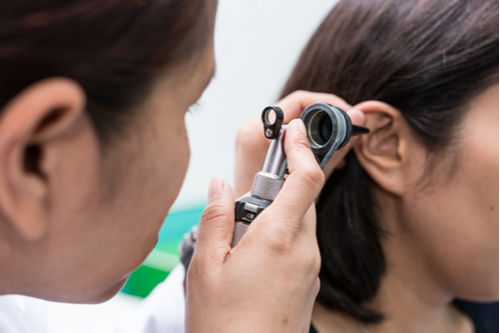General Health
How To Prevent Hearing Loss?
5 min read
By By Apollo 24|7, Published on - 03 March 2022, Updated on - 27 February 2024
Share this article
1
1 like

According to the World Health Organization, a staggering 5% of the global population suffers from severe hearing loss that requires rehabilitation. In India, more than 6.3 crore people are believed to be suffering from hearing loss. Experts suggest that without effective public health strategies and clinical intervention, the number of people affected by hearing impairment will only increase with time. Every year, on 3rd March, countries all over the world observe World Hearing Day, to increase awareness around hearing loss, prevent deafness, and promote actions that improve hearing and ear care. Let us understand the ways to prevent this physical disability.
What Is Hearing Loss?
Hearing loss refers to a condition that causes total or partial inability to hear sounds. It occurs when any part of your ear fails to work properly. Though hearing loss occurs at a very slow pace, some people may experience it unexpectedly.
Symptoms of Hearing Loss
You may not notice any unusual symptoms of hearing loss in the beginning. However, the signs that may be experienced over time include:
- Difficulty in clearly hearing while conversing
- Misunderstanding what other people are saying
- Asking people to speak loudly
- Watching TV or listening to music at a higher volume
- Not being able to engage in a conversation
- Avoiding or withdrawing from social settings
Some of the serious symptoms of hearing loss include sudden hearing loss, ringing sensation in one or both ears, ear pain, headaches, numbness, and generalised weakness.
Types of Hearing Loss
Broadly, hearing loss is classified into three major types:
- Conductive Hearing Loss: It occurs when something obstructs the passage of sounds from the outer ear to the eardrum and the middle ear. This type of hearing loss is not always permanent as in most cases, the hearing is restored with medicine or surgery.
- Sensorineural Hearing Loss: It occurs when there is significant damage to structures of the inner ear, the cochlea, or the nerve pathways to the brain (auditory nerve). Sensorineural hearing loss is generally permanent.
- Mixed Hearing Loss: It occurs when conductive hearing loss and sensorineural hearing loss happen together. Surgical intervention may restore hearing to a certain extent, however, it may not be very effective.
Causes of Hearing Loss
Hearing loss can occur due to several reasons, some of which are:
- Conductive Hearing Loss:
- Ear infections
- Trauma
- Excessive buildup of earwax
- Malfunction of ossicles (bones of the middle ear)
- Perforated or defective eardrums
- Cholesteatoma (skin growth in the middle section of the ear)
- Sensorineural Hearing Loss:
- Congenital (birth) defects
- Ageing
- Skull trauma
- Prolonged exposure to high-frequency sounds
- Acoustic neuroma (a tumour on a nerve that links the ear to the brain),
- Meniere’s disease (inner ear disorder)
- Infections such as meningitis, measles, mumps, and scarlet fever
- Mixed Hearing Loss: It can be caused by a combination of factors responsible for both conductive hearing loss and sensorineural hearing loss.
Hearing Loss Treatment
Treatment for hearing loss depends on the underlying cause and severity of the symptoms. Some of the treatment options for hearing loss include:
- Removing earwax blockage: Hearing loss caused by the excessive buildup of earwax can be successfully treated. The doctor removes earwax from your ear by pulling it using suction or a small tool with a loop on the end.
- Surgical intervention: Hearing loss due to abnormalities of the eardrum or bones of hearing (ossicles) is treated by surgical intervention. To reduce the occurrence of repeated infections along with fluid buildup, a small tube is inserted in the ear to help drain out fluids.
- Hearing aid: If your hearing loss is a result of damage to the inner ear structure, a hearing aid may be prescribed. The physician will discuss the likely benefits of the device before fitting it in the ear.
- Cochlear implants: The device is helpful for people suffering from severe hearing loss. It works by provoking the auditory nerve to directly send signals to the brain, thereby enabling hearing.

Is It Possible to Prevent Hearing Loss?
Certain types of hearing loss can not be prevented. However, it is possible to avoid noise-induced hearing loss and limit the worsening of hearing loss related to ageing. Some of the measures that can protect your hearing are:
- Avoid loud noise: Noise levels are measured in decibels (dB). Any sound higher than 85dB is considered harmful. The best way to protect your hearing from noise-induced hearing loss is to avoid loud noises as much as possible.
- Use earphones judiciously: Listening to loud music via earphones can damage your hearing over time. To avoid damaging your hearing, limit the maximum volume to less than 60%. Avoid using earphones for more than an hour at a stretch.
- Protect your ears during loud events: Music concerts and parties at nightclubs can take a toll on your hearing. To protect your ears, move away from loudspeakers and try to take a break every 15 minutes. If possible, avoid such events altogether.
- Wear protection at work: Wear protective hearing gear if your occupation entails exposure to loud noises. Devices like earplugs and earmuffs can reduce noise by 15 to 30 decibels. Ensure the equipment fits tightly to block out noise.
- Get tested: If you are experiencing trouble hearing conversations, get a hearing test as quickly as possible. This would help detect and treat the condition at an early stage.
Hearing loss affects millions of people all over the world. Since hearing loss develops slowly, the symptoms may go unnoticed initially. However, if it remains undiagnosed, it can affect your ability to communicate effectively with others, resulting in poor quality of life. If you notice any decline in your hearing, contact your physician for further investigation.
Worried about hearing loss?
General Health
Consult Top Ent Specialists
View AllLeave Comment
Recommended for you

General Health
Reasons Why You Should Try Rehabilitation Physiotherapy For Persistent Neck Pain
Living with persistent neck pain can impact your ability to work, enjoy your hobbies, and even perform simple daily tasks. However, through rehabilitation physiotherapy, you can alleviate your pain and improve your quality of life.
.jpg?tr=q-80)
General Health
Why ESR is High in Females? Causes of Elevated ESR in Women Explained
Learn why ESR is high in females, its causes, and health implications. Understand the role of hormones, inflammation, and lifestyle factors in elevated ESR levels.

General Health
Your Loss Of Appetite Can Be A Sign Of Heat Stroke!
Exposure to extremely hot weather can result in a heat stroke. It can be life-threatening, therefore requires immediate treatment.
Subscribe
Sign up for our free Health Library Daily Newsletter
Get doctor-approved health tips, news, and more.
Visual Stories

Plant-based Foods That Are a Great Source of Iron
Tap to continue exploring
Recommended for you

General Health
Reasons Why You Should Try Rehabilitation Physiotherapy For Persistent Neck Pain
Living with persistent neck pain can impact your ability to work, enjoy your hobbies, and even perform simple daily tasks. However, through rehabilitation physiotherapy, you can alleviate your pain and improve your quality of life.
.jpg?tr=q-80)
General Health
Why ESR is High in Females? Causes of Elevated ESR in Women Explained
Learn why ESR is high in females, its causes, and health implications. Understand the role of hormones, inflammation, and lifestyle factors in elevated ESR levels.

General Health
Your Loss Of Appetite Can Be A Sign Of Heat Stroke!
Exposure to extremely hot weather can result in a heat stroke. It can be life-threatening, therefore requires immediate treatment.

